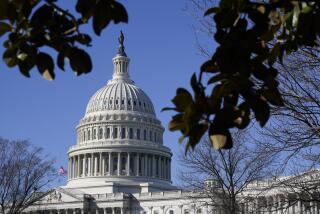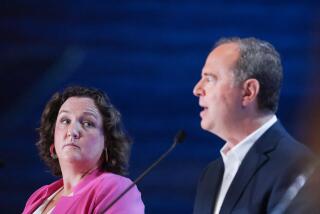Lobbyists Drawn to House Tax Panelists’ Fund Drives
- Share via
WASHINGTON — Would you pay $1,000 to have breakfast with Frank J. Guarini? You would if you were Vincent Reusing.
Guarini, a Democratic congressman from New Jersey, sits on the powerful House Ways and Means Committee, which is about to tackle sweeping proposals to revise federal tax laws. And Reusing, a lobbyist for the Metropolitan Life Insurance Co., cares deeply about what Congress does to the tax code.
So, for the benefit of Guarini’s next reelection campaign, Reusing and 26 other insurance lobbyists forked over $1,000 apiece--and not just for the scrambled eggs, sausage and kiwi fruit. “It was very intimate and gave the attendees an opportunity to talk to Frank in a relaxed setting,” Reusing said.
Like Guarini, fully two-thirds of the 36-member panel have had or are planning Washington fund-raising events, to which they have invited thousands of representatives of numerous special-interest groups and their political action committees. Rep. Robert T. Matsui (D-Sacramento), for example, has invited 2,500 persons, including 1,893 lobbyists representing everything from the Campbell Soup Co. to the Nut Processors Assn.
Not only are the tax writers scheduling their fund-raisers long before next year’s elections, most are charging double and quadruple the $250 ticket price of most House events. Although committee members deny it, some lobbyists suspect that they are trying to capitalize on the tax reform issue.
“This is a golden opportunity,” said lobbyist Cliff Madison, who represents two airlines and three local governmental agencies. “Right now, the entire tax code is up for grabs. People are going to want to participate in that process, whereas afterward it will be a little tougher to pry money out of the people that get hurt.”
Fred Wertheimer, president of Common Cause, the self-styled citizens’ lobby, argues that this kind of participation is corrupting the legislative process. “Tax reform is the World Series of economic impact,” he said, “and with the members of Ways and Means getting almost half their campaign money from PACs now, this is a very dangerous situation.”
Committee members, brushing off the notion that they are being opportunistic, note that many other senators and representatives are scheduling fund-raisers this spring as part of a trend toward accumulating campaign treasuries well in advance of the next election. The primary aim, these lawmakers say, is to raise enough cash to scare off potential opponents.
Staving Off Challengers
“You’re right to question whether (Ways and Means) members are doing the fund-raisers because of the tax bill,” said Rep. Thomas J. Downey (D-N.Y.), himself a committee member. “But, in fairness to us, we anticipate that the best way to stave off serious challenges is to have a large war chest.
“Next question: Have we found it easier to raise money because of the tax bill? Marginally so. It’s not like people are beating down the doors to come to a $500 or $1,000 event. They’ll come, but you have to chase them.”
Rep. Bill Frenzel (R-Minn.), another committee member, said he is planning a $500-a-ticket fund-raiser next month “so we won’t have to work so hard next year, when everybody else will be looking for money.” The looming tax reform issue will not coax contributions from lobbyists seeking to influence the votes of committee members, he said, because the positions of most members are already clear.
Guarini maintained that there is no link between his fund-raisers and tax reform. An aide said that lobbyists are told that the congressman will discuss tax reform and international trade, another big item on the Ways and Means agenda this year, but Reusing, the Metropolitan Life lobbyist, said Guarini barely touched on tax reform at the breakfast he attended. “Mostly, he related his experiences traveling to Russia,” Reusing said.
Smaller Gatherings
Although most congressmen raise funds at mass cocktail parties, Guarini and two of his committee colleagues have hit upon the idea of smaller breakfasts, lunches or dinners for particular industries or interest groups.
These intimate settings appeal to lobbyists, Guarini said, because “you can discuss in depth the issues pertinent to a particular industry, instead of mixing 10 different issues” of interest to a large, diverse crowd. At the insurance industry breakfast, for example, Guarini reiterated his opposition to a Treasury Department proposal to tax the growing cash value of life insurance policies.
The congressman said he has chosen breakfast as the time to get together with his contributors because “you have a certain freshness of people there who haven’t been through a long tiring day with five cocktail parties to go to at night.”
Like Guarini, Rep. James R. Jones (D-Okla.), who raised $694,000 from PACs in winning a tight race last November, is planning a series of intimate, $1,000-a-plate meals for various industry groups. But in Jones’ case, the sessions are over lunch or dinner.
Cole Finegan, an aide to Jones, said a lobbyist friend of the congressman, R. Duffy Wall, who represents various insurance clients, is organizing one of the events. But as Finegan was providing this information, Jones ordered him to withhold additional details. “He told me, ‘Don’t give away the recipe of the prize-winning cookie,’ ” Finegan said.
Rep. Ronnie G. Flippo (D-Ala.) has staged both mass cocktail parties and intimate dinners this spring--and offered a discount of sorts. Lobbyists who attended his $1,000-a-ticket cocktail party could go for half price to one of his $1,000-a-plate dinner parties.
Rep. W. Henson Moore (R-La.), who is gearing up for a Senate race expected to cost between $3.5 million and $5 million, is going after PAC money early, according to an aide, Joe Karpinski, “because most PACs will not contribute to competing candidates. We want to cut off contributions to our opponents.”
Similarly, Matsui, with his $300 cocktail-party fund-raiser Wednesday, is seeking to fatten his war chest, even though he finished his last campaign with a $277,000 surplus--and had no opponent.
“I want to be on the safe side in the event that, in 1986, I have a big challenge for my (House) seat,” he says. “And I certainly want to keep my eyes open for a potential statewide office, though it doesn’t appear now there will be any opening next year.” Matsui is known to be interested in the Senate, but Democrat Alan Cranston is planning to seek reelection next year, and Matsui is unlikely to challenge him.
Distasteful Process
Even as they collect thousands of dollars for their next campaigns, many Ways and Means Committee members say they loathe the fund-raising process. Guarini, calling fund-raising “the most distasteful part of public life,” said he is charging $1,000 a ticket to his four breakfast fund-raisers because “elections are costing more and more. Unfortunately, we don’t have public financing” of campaigns.
Downey, who collected more than $40,000 at a $500-a-ticket March fund-raiser, called the role of money in politics “obscene. For those of us who are in marginal districts, it just consumes too much time.”
In the 1984 campaign, 32 Ways and Means Committee members received nearly $6 million from PACs--an average of $187,000 per member. Four of the panel’s members--Philip M. Crane (R-Ill.), Andrew Jacobs Jr. (D-Ind.), Bill Archer (R-Tex.) and Bill Gradison (R-Ohio)--do not accept PAC money.
Gradison, who easily won reelection last year, said he refuses political action committee money solely to avoid press criticism suggesting that his votes might be related to a specific contribution. “I have nothing but good things to say about PACs,” he said. “They make it possible for small contributors to get much more involved in the election process than ever before” by contributing to management or union PACs where they work.
How Much Influence?
The lawmakers who accept PAC money insist that contributors gain access to their offices--but not to their votes.
“What a good lobbyist will do when he shows up at an event,” Downey said, “is identify himself or herself and say: ‘Can I talk to you sometime about this issue?’ If you’re at a fund-raising event, you’re not likely to say, ‘No, don’t bother me.’
“Never in my experience,” Downey added, “has anyone said, ‘Hey, we’d appreciate your vote.’ ”
But Common Cause’s Wertheimer, who regards the system as more pernicious, contends that political action committee contributions can have a powerful influence on how legislation is shaped.
“The major barrier to tax reform,” he said, “will come from special-interest groups with special-interest PAC money, fighting to protect their special tax preferences.”
More to Read
Get the L.A. Times Politics newsletter
Deeply reported insights into legislation, politics and policy from Sacramento, Washington and beyond. In your inbox twice per week.
You may occasionally receive promotional content from the Los Angeles Times.







